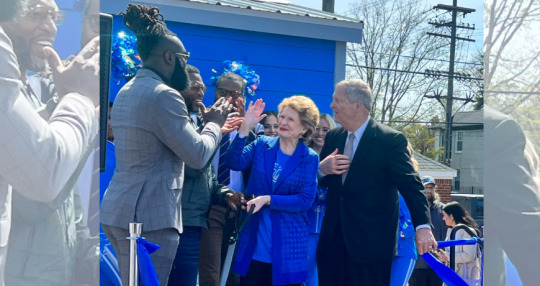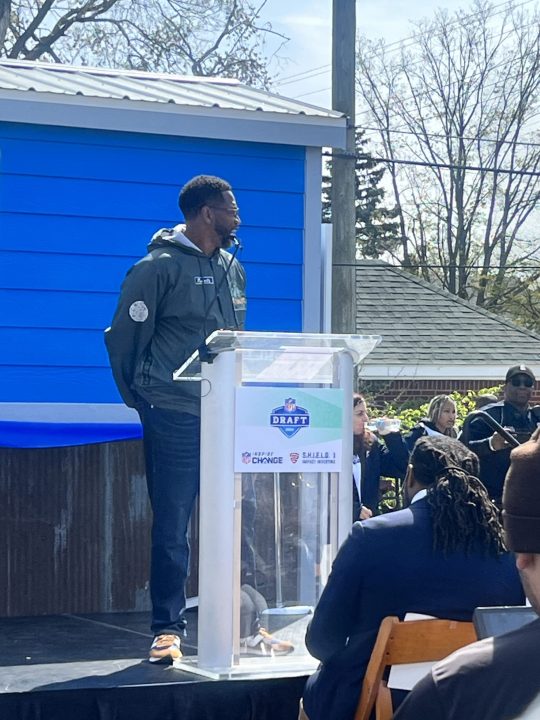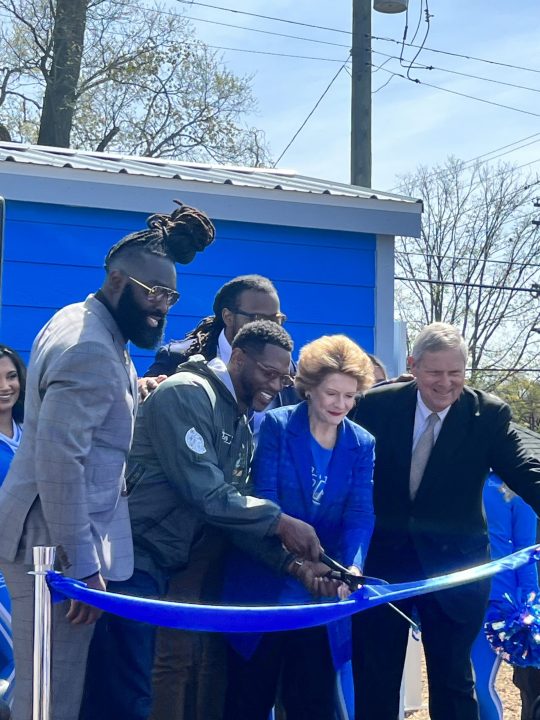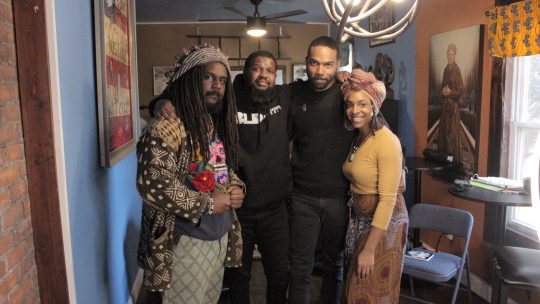Text
Don Carlos - Movin (To The Top) Live at California Roots 2019
youtube
3 notes
·
View notes
Text

Sauce Gardner, a prominent name in the world of American football who once played for Detroit PAL Youth Football and later became a Pro Bowl New York Jet cornerback, surprised his hometown with an unexpected act of kindness during the NFL Draft.
The lucky metro Detroit school-aged youth received brand-new Microsoft Surface laptops. Each youth also received one-on-one time with him and an individual picture. Before arriving to surprise the youth, Gardner made the day even more memorable by signing t-shirts and footballs for the children to take home.
“Being able to see these kids’ faces light up while walking in is just a blessing because I know a lot of these kids look up to me. It’s a blessing to be an example on and off the field. Every day, I wake up with a purpose,” Gardner said.
One of the cornerstones of Gardner’s philanthropic endeavors is his dedication to mentoring and empowering young people. Recognizing the pivotal role of positive role models in his life, he’s made it his mission to pay it forward. Whether it’s through hosting football camps, speaking engagements at schools, or returning to Detroit PAL, where it all started for him, Gardner is actively involved in shaping the next generation.
“I’m excited about what the future holds. I’m sure I will have another camp coming up this year, and I’m sure it will be here (Detroit PAL), and I’m looking forward to it. I look forward to seeing these kids here, whether they are coming to participate in the training camp or coming to see me. They will be well taken care of,” Gardner said.
Gardner, a native of Detroit and Martin Luther King High School alum established the Sauce Gardner Family Foundation Football Camp to empower underprivileged teens. The camp was designed to hone football skills while instilling values such as leadership, hard work, and the significance of education.
Detroit PAL CEO Fredrick D. Hunter introduced Sauce Gardner and expressed his enthusiasm and pride. Hunter’s remarks were filled with excitement. While reflecting on the significance of this surprise occasion, he thanked Microsoft, Wasserman Sports Agency, and the NFL Player Association.
“How amazing to have one of our very own who grew up in the PAL league playing football and continued to work on his game to elevate to be one of the, if not the best, cornerbacks in the NFL. We are proud to call him one of our own,” Hunter said.
#Detroit#Detroit Students#PAL#Sauce Gardner Family foundation#NFL Star Sauce Gardner Gifts 25 Detroit PAL Youth with Microsoft Surface Laptops#Black Students Matter#Black Lives Matter#nfl
0 notes
Text

Babyface Ray made a surprise heartfelt appearance at the Boys & Girls Club of Southeastern Michigan during the 3Cs Sports Conference amid NFL Draft at the Dick & Sandy Dauch Club location.
The famous rapper is renowned for using his powerful platform to inspire and uplift his community, and his presence at the event was nothing short of motivational and enriching.
“I feel good about giving back because you never know what these kids are going through in their daily lives. To be able to come out, see the kids, and they meet me and see me in real life, and I’m actually helping to give back,” Babyface Ray said.
The surprises didn’t stop there as Babyface Ray went above and beyond by generously giving away tablets and bikes to the youth. He took the time to take pictures of all the youth receiving their gifts.
Following the giveaway, Babyface Ray participated in a friendly competition racing cars on the Grand Prix miniature track activation. Grand Prix also had a life-sized race car onsite parked out front of the club for viewing and photo ops.
As local youth arrived and waited for the special guest, they were greeted with tech activations from The Bus Stops Here Foundation and WiFi on Wheels (W.O.W.) CyberBus is a program birthed by the Housing Authority of the City of Pittsburgh (HACP).
DJ Low Simmons created an electrifying atmosphere, filling the gymnasium with hype tunes, keeping the excitement and energy high while the families enjoyed the festivities together.
Angel Ayaer and many other parents watched their children have fun playing the tech activations provided by CODE313 and enjoy themselves during the event.
“It gives them something to do, like meet and experience different people. I’m actually excited because he (Babyface Ray) is giving back to the community. I used to be in the Boys and Girls club, and it was relaxed afterward because my older kids didn’t get a chance to experience many things my younger kids are getting ready to experience because of the Boys and Girls Club. So, I’m very excited for today’s event and what’s to come,” Ayaer said.
#Babyface Ray’s Heartfelt Gesture: 150 Pairs of New Balance Shoes for Boys & Girls Club of Southeastern Michigan Youth#Detroit#Babyface Ray#boys and girls clubs#CODE313
0 notes
Text

The excitement of the draft has truly permeated the city, bringing energy and enthusiasm that extends far beyond downtown festivities and the general passion for football. Importantly, this event has also shone a light on something less expected but deeply significant: urban agriculture. As the city celebrates new team picks and enjoys its moment in the sports spotlight, community gardens and urban farms are gaining recognition as vital elements of urban life.
It is all too common for underprivileged communities to endure substandard conditions that shouldn’t even be an issue, such as access to clean food. Likewise, our veterans, who have sacrificed immensely for the US, are frequently neglected. Despite the sensitivity of this issue, it reflects our reality. This has spurred a number of grassroots organizations, policies, and nonprofits, both locally and politically, to take action. Among them is the NFL and S.H.I.E.L.D 1, a nonprofit founded by NFL players aimed at boosting economic mobility in underserved areas. They showcased the Green Boots Veteran Community Horticulture Gardens and Marketplace for their community ribbon-cutting event on the city’s westside, which features a GroShed. GroSheds are hydroponic gardening sheds designed for cold climates, allowing year-round access to nutritious, non-toxic, affordable whole foods, thereby addressing the seasonal gaps in fresh produce availability in these communities.
The excitement behind the draft have touched down in the city but it goes beyond the confines of downtown and the fun times and the love of football, this has placed a spotlight on urban agriculture.
Green Boots not only offers nutritious food choices for the local community but also provides a therapeutic outlet for veterans like its founder, Travis Peters, to engage in gardening and improve their mental health.

PHOTO: Travis Peters, Green Boots Community Horticulture Gardens and Marketplace
“My mission was to sustain myself, my family, and my community through urban agriculture without leaving our veterans out of the picture,” said Peters. “This place is a multifaceted space where we focus on urban agriculture basic training for our veterans and community along with horticulture therapy and protocols to help bridge the wellness gap.”
“The GroShed will allow us to produce food at a higher rate, a faster and a more economical rate” Peters said. “This space has no city municipalities connection whatsoever. We run on solar power and rainwater, I rely on nature and just what the earth gives us.”
Standing alongside community members and local media were NFL Commissioner Roger Goodell, United States Secretary of Agriculture Tom Vilsack, Senator Debbie Stabenow, New Orleans Saints Linebacker Demario Davis, NFL Cornerback Josh Norman, and NFL Legend Alex Lewis.
“Travis is an extraordinary man and I’m proud to be here on behalf of the NFL,” said Goodell. “I’m also inspired by our players. There are two players here that have really led the way. Damario Davis and Josh Norman. For the last 4 or 5 years I’ve heard about this concept and their desire to make this happen and they have worked to make this happen. It has been their undying support to bring this into fruition not just here in Detroit but also in Buffalo. These men are not just great professional athletes, they are stand up men.”

PHOTO: New Orleans Saints Linebacker Demario Davis, Travis Peters, NFL Cornerback Josh Norman, Senator Debbie Stabenow, United States Secretary of Agriculture Tom Vilsack.
This event is part of the NFL’s Inspire Change social justice initiative. Inspire
Inspire Change is designed to reduce barriers to opportunity, especially in communities of color, demonstrating the collective efforts of the NFL family—current and former players, teams, owners, and the league office—to foster positive change. The initiative operates at all levels within the league, with a mission to showcase their commitment to social justice and community improvement.
This GroShed initiative all started when Davis took a trip to Flint, MI a few years ago and realized there was a need for clean water. At the time he witnessed truckloads of water bottles being dispersed throughout the city, but he had an epiphany regarding his charity work, “What’s going on with the water system? That’s when we moved from doing just the charity work to finding sustainable solutions in the community.”
“This is a continuation of our work that we’re doing in other cities,” said Davis. “We are committed to bringing sustainable solutions to communities that have traditionally been marginalized. This work touches me personally. It brings our hearts joy.”
The NFL is collaborating with the White House on the “Challenge to End Hunger and Build Healthy Communities” initiative, highlighting this effort at the event.
Amidst the backdrop of steel and concrete, a transformation is quietly taking root—a healthy mindset. Spearheaded by Peter and powered by the enduring strength of the local Black community, this initiative isn’t merely about planting vegetables; it’s a reclaiming of urban spaces, turning them from symbols of decay into beacons of hope and growth. These community gardens are not just places to grow food; they are sanctuaries of empowerment, where residents, burdened by economic hardships and societal neglect, find a powerful form of expression and control over their lives and environment.
Peter’s movement is leveraging a rich yet underrecognized legacy of Black horticulture expertise, challenging the stereotype that urban communities lack the green thumbs or know-how. Each garden plot and GroShed serves as a testament to resilience and innovation, with every plant sown echoing the community’s deep-rooted connection to the land and their ancestors wisdom. This isn’t just about horticulture; it’s about cultural heritage, community, a bridge connecting past generations who tilled the soil for sustenance to a modern movement for food sovereignty and social justice.
“I started a number of years ago putting in place opportunities and extra support where veterans can go into farming,” said Senator Debbie Stabenow and chair of the agriculture, nutrition and forestry committee in Washington D.C. “We now have veteran organizations and veteran farmers around the country with the largest group in Michigan.”
Absolutely, agriculture transcends the rural boundaries we often confine it to; it’s very much a vibrant part of urban landscapes as well. Urban agriculture is about more than just growing food; it’s about building community, fostering sustainability, and ensuring access to healthy, affordable meals. Echoing this sentiment, Senator Debbie Stabenow said, “This is about providing healthy food in a sustainable way right here in our urban communities.”
This movement reshapes the concept of what it means to be a community. It’s a collective effort where city dwellers reconnect with their food sources and with each other, breaking down the isolation that urban environments can sometimes foster. Urban agriculture initiatives make it possible for fresh produce to travel just a few yards from soil to table, drastically reducing food miles and providing a stark contrast to the impersonal nature of mass food production.
Moreover, these initiatives are a testament to the adaptability and ingenuity of urban communities. Each space cultivated is a step towards a more sustainable urban existence, proving that the heart of agriculture isn’t found solely in wide-open spaces but wherever there are people willing to plant the seeds of change.
“The Greenboots community displays the real work,” Davis said. “You guys are the heroes and deserve the brightest light to be on you all. They are on the ground doing the work, it is people that are in the trenches that really keep the game going. So, thank you for your work.”
#Draft Day Spotlight: Beyond the Field#the NFL and Detroit Embraces Urban Agriculture#Detroit#Detroit Gardens#Detroit Urban Ag#Grosheds#Greenboots#Detroit Greening#Challenge to End Hunger and Build Healthy Communities#End Hunger#End Childhood Hunger in America#End Hunger Initiative#Flint Michigan#Flint Water Crisis#GroShed initiative#Lil Miss Flint
1 note
·
View note
Text

After 14 years of tireless work and community support, Detroit is celebrating a major victory! The city’s first Black-led and community-owned grocery store, the Detroit People’s Food Co-op (DPFC), is opening its doors on May 1st, 2024. This marks a historic moment in Detroit’s fight for food justice and economic empowerment.
“This is the result of a diverse community coming together to create a solution for everyone in Detroit,” said Lanay Gilbert-Williams, president of the DPFC board. “There’s no other business in the city with over 2,500 owners from across the city and state.”
More Than Just a Grocery Store
The DPFC is more than just a place to buy groceries. It’s a beacon of hope and a symbol of Detroit’s resilience. Built on cooperative principles, the store offers affordable, locally sourced, and culturally relevant food options to residents. It also aims to stimulate economic growth within the North End neighborhood and beyond.
The DPFC is located inside the Detroit Food Commons, which will officially open its doors on May 18th. This new center is a testament to the collective power of community and taking control of the food system. Anyone 21 or older living in Michigan can become a member-owner, although membership isn’t required to shop.
Fresh, Local, and Inclusive
Situated in Detroit’s North End, the DPFC offers a wide selection of products, including fresh produce sourced directly from local farmers whenever possible.
“We’re excited to welcome our community into a welcoming and inclusive environment centered on fresh, locally grown produce from Detroit’s own farmers,” said Akil Talley, DPFC’s general manager. “We’re confident we have the best prepared foods department in Michigan, and we can’t wait to open our doors!”
A Hub for Education and Empowerment
The second floor of the Detroit Food Commons, managed by the Detroit Black Community Food Sovereignty Network, will serve as a center for educational workshops, community events, and health and wellness initiatives. It will also feature four commercial kitchens and a rentable hall.
The DPFC is part of a larger movement for Black food sovereignty and economic empowerment in Detroit. They partner with local businesses, urban farms, and community organizations to build a more resilient and sustainable food system that benefits everyone in the city.
Join the Celebration!
“On opening day, I want everyone in Detroit to walk through our doors and feel like this is their store,” said Talley.
The DPFC opens for business on May 1st, 2024, at 11:00 AM. Regular hours are 8:00 AM to 8:00 PM daily.
The grand opening celebration and ribbon cutting for the Detroit Food Commons will be held on Saturday, May 18th, 2024, starting at 11:00 AM. The entire community is invited to celebrate this new era for Black food sovereignty in Detroit
#Detroit#Food Co-op#Detroit Food#Detroit People’s Food Co-op#Black Lives Matter#Detroit Black Community#Malik Shabazz#Detroit Food Commons
10 notes
·
View notes
Text

Detroit-based nonprofit Focus: HOPE is revolutionizing access to health care by offering free mobile health services and mammograms across its food centers. These services will be available until the fall, ensuring wider access to essential health screenings for the Detroit community.
Focus: HOPE has partnered with Wayne State Mobile Health Units and Ascension Michigan to facilitate these crucial services. The collaboration aims to address and reduce disparities in healthcare access, especially in marginalized communities.
Service Details:
Wayne Health Mobile Units: These units are fully staffed with registered nurses and medical assistants who will provide screenings for diabetes, cholesterol, and high blood pressure.
Mammogram Screenings by Ascension Michigan: Essential for early detection of breast cancer, these screenings will be conducted monthly at designated Focus: HOPE food centers.
Event Schedule and Registration:
The Wayne State Mobile Unit will be available from 10 a.m. to 1 p.m. at Focus: HOPE’s Westside Food Center, located at 1300 Oakman Boulevard in Detroit. These services are scheduled for the first Thursday of every month from April 4 to October 3, with an exception in July when the services will be available on Thursday, July 11.
Mammogram services will be operational from 9 a.m. to 3:45 p.m. on specific Mondays. Interested individuals must register in advance by calling 313-494-4600.
Mammogram Service Locations and Dates:
Westside Food Center: April 15 and June 17; 1300 Oakman Boulevard, Detroit
Eastside Food Center: May 20 and August 19; 9151 Chalmers Street, Detroit
Inkster Food Center: July 15; 759 Inkster Road, Inkster
Westside Food Center: September 16; 1300 Oakman Boulevard, Detroit
A Call to Action from Leadership: Portia Roberson, CEO of Focus: HOPE, emphasized the critical nature of these services, stating, “These services are fundamental to the well-being of our community. We recognize the disparities in health care access faced by marginalized communities and aim to bridge these gaps.”
Background Statistics: Data from a 2018 University of Michigan’s Detroit Metro Area Communities Study highlighted health care challenges in Detroit:
One in five Detroiters reported their health as fair or poor.
Nearly 10% were unable to afford a copayment or prescription.
Less than a third had access to the type of health care they desired.
These mobile health services are part of Focus: HOPE’s commitment to fostering a healthier community by providing essential health care access to those most in need.
#Focus Hope#Detroit#Detroit Health#Focus: HOPE Provides Free Mobile Health Services in Detroit#community health#community health outreach
1 note
·
View note
Text

Walking into Mama Akua’s Community House for the first time is jarring but in a good way.
On the outside, it doesn’t look like much. In fact, if it wasn’t for the large pan-African sign in the front, most people would assume that it was just another old building slowly decaying in Z8ne (a local nickname for the 48208-zip code pronounced “Zone 8”). But once you step through the front door into the gathering space, your vision is bombarded with images of Black power and intellectualism.
Everywhere your eyes can fall, there are depictions of Black leaders, thinkers, and culture. Yet, the home still finds a way to feel extremely inviting. Seats and tables are readily available throughout the home, Black music fills the place from open till close, and the smell of home-cooked meals invites all who visit to stay for a while. Even without ever hearing about the house or its founder, it’s automatically evident to anyone who walks in that this is a safe space for Black people and a resource for the surrounding community.
Dr. Yusef “Bunchy” Shakur is the founder of Mama Akua’s Community House. Born and raised in Z8ne, he found himself engulfed in street life during his teen years and ultimately was thrown in prison for a crime he didn’t commit. However, it was there in that prison where he would meet his father for the very first time and where he would slowly rewrite his mental, intellectual, and spiritual state of being. By the time he was finally released, Shakur had transformed into a full-blown Black revolutionary with a burning desire to help his people.
The idea of creating a space for his community wasn’t new to Shakur. He had done something similar with a cybercafe that he ran a decade prior. What was different about this project was that he planned to renovate an old house in the area and turn it into a small-scale community center. The house would then serve two purposes, as a resource to the people of Z8ne, and as a form of resistance against the gentrification sweeping the city.
The name is a kind of social rebellion as well. Inspired by the Ghanaian culture of matriarchy and the philosophy of “giving people their flowers while they can still smell them,” Shakur decided to name the house after the still-living Detroit activist as opposed to naming it after some long-gone Black thinker.
Shakur further explained this decision in an interview a few months before the house’s completion. “As a Black man that had been influenced and raised by Black women, and overstanding that relationship, and part of our struggle is against patriarchy and we tend to, whether we realize it or not, especially as a man, uphold patriarchy in many ways. So I’m doing my part in deconstructing that in naming it after a Black woman who exemplifies liberation and exemplifies the values that we want to have to achieve it through transformation.”
The mission of the house is simple: provide resources to the neighborhood and cultivate Afrocentric thought amongst its visitors. According to Shakur himself, the best way to accomplish this is by being whatever the community needs.
“[We fulfill our mission] by being a multi-purpose space. We have the Amy Jo’s Gathering Space for folks to come in interact and engage. he Abigail kitchen where we cook a meal once a month and distribute it to the community. We do movie nights. There’s an after-school program that runs out of here. There’s outdoor events. There’s just a multitude of things that we do. And keep in mind that we’re in a neighborhood that has been under siege by high-level gentrification that’s taken away from the quality of the community and we’re continuing to fight for the quality of the community.”
With the help of other like-minded individuals they call “community partners,” the house is able to offer things like free daycare on Thursdays, F.A.T (Fresh And Tasty) Burger Fridays, where they offer fast and healthy food at a low price, and free community dinners every last Saturday of the month. Wednesdays through Fridays, Mama Akua’s operates like a workspace where anyone can sit down and enjoy a cup of coffee or juice while getting some work done.
Mama Akua’s does much more than feed the hungry, however. In addition to their normal services, the house hosts several classes and seminars put on by community partners monthly. Everything from courses on personal finance to group talks about romantic relationships is hosted in their classroom. Small businesses can set up a table at their “Circulate the Black Dollar” pop-ups and sell they’re products. Several donation drives and giveaways are held throughout the year. Local artist can use their indoor or outdoor stage for their performances.
In many ways, the community partners of Mama Akua’s are just as important as the building itself. The house may have been Shakur’s dream, but it fully belongs to the neighborhood. Not only do the residents of Z8ne benefit from the house, but they contribute to it. From the classes to the donations, Mama Akua’s is for the people, by the people. What they put in they get back both monetarily, and timewise.
“If there’s 10 programs operating out of here, seven of them are with our community partners, and three of them are in-house,” Shakur said. “We truly believe that circulating the dollar, particularly the Black dollar, is not about improving our bottom line. So if you come buy a burger here, there’s a percentage of those funds are going directly back into our community initiatives and our community programs.”
Despite being small, Mama Akua’s Community House is having a big impact on the community it serves. As the threat of gentrification looms larger with every passing day, the house also grows stronger with every person who comes through their doors looking to contribute.
In fact, Shakur and his collaborators are already working on creating a second community house right next to the first and are considering combining the two backyards so that they can host larger outdoor events. Only time will tell if Shakur’s plan to fight gentrification will succeed, and only he knows how many houses he plans to buy and repurpose. Whatever the case may be, two things are for certain: Dr. Yusef Shakur doesn’t plan on going anywhere anytime soon, and the people of Z8ne have his back.
Mama Akua’s Community House is a Place for Hope in Zone 8 | The Michigan Chronicle
#Mama Akua’s Community House is a Place for Hope in Zone 8#Detroit#Detroit Michigan#Mama Akua#Zone 8#community spots#Dr. Yusef “Bunchy” Shakur#Black Revolutionary Action#community#Circulate the Black Dollar#giving people their flowers while they can still smell them#black lives matter#black history#black power
3 notes
·
View notes
Text
Lil Miss Flint Still On The Case 10 years later

#flint#Lil Miss Flint Still On The Case 10 years later#lil miss flint#water crisis#flint michigan#toxic water#michigan
5 notes
·
View notes
Text

Democrats outnumber Republicans so we can vote them and fix everything.
57 notes
·
View notes
Text
0 notes
Text
sometimes i fantasise about people shutting the fuck up
36K notes
·
View notes
Text
Richard Pryor On People Trying To Sound 'Black' | The Dick Cavett Show
youtube
5 notes
·
View notes
Text
Well, I guess this didn't turn out the way they thought. It would. being a bully n a racist Doesn't work in today's AI society especially when people can tell that it's AI.
Maryland educator accused of using AI to frame the school's principal
youtube
4 notes
·
View notes

